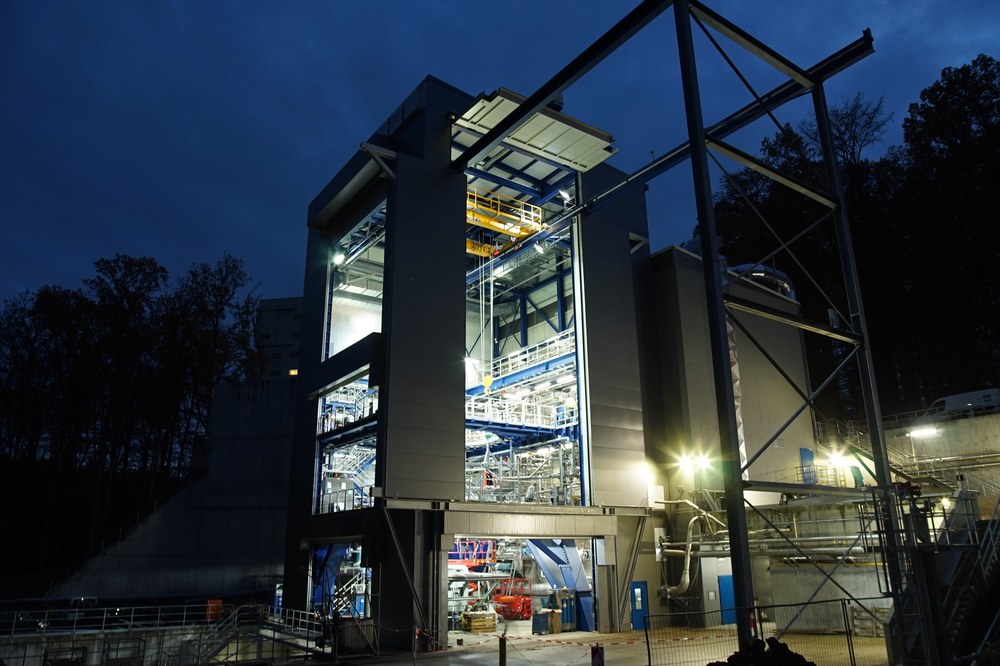Ninth Industrial Days at the DLR site in Lampoldshausen



- At a two-day conference, representatives from industry, research and government organisations exchanged views on future technologies for European space transport.
- The focus was on the requirements for test and launch facilities.
- Ensuring the competitiveness of European launchers is a high priority.
- At its Lampoldshausen site, DLR offers a test infrastructure for all liquid-fuelled, chemical space propulsion systems that is unique in Europe.
- Focus: Spaceflight, space transport, launch systems, New Space
Increasing demand, new participants offering innovative launcher concepts and the need for a significant increase in flexibility and cost effectiveness – space transport is facing major challenges. At the Ninth Industrial Days of the German Aerospace Center (Deutsches Zentrum für Luft- und Raumfahrt; DLR), experts discussed what contribution large-scale test infrastructure can make to prepare space transport for the future and how artificial intelligence (AI) methods can make development and test processes faster and more cost-effective. Around 80 participants from space agencies, government organisations, industry and research came together at the DLR site in Lampoldshausen on 20 and 21 April 2022.
European space transport – increasing demand, new opportunities
A closer look at the global space market reveals a technology sector in transition. The European commercial launcher market is facing major challenges. To keep pace, established launcher concepts must be combined with innovative propulsion technologies. In addition, the importance of highly complex digital testing and validation processes is also growing. “The work, expertise and unique test stand infrastructure at the DLR site in Lampoldshausen are an indispensable component for the competitiveness of the German and European space industry in the launcher sector,” emphasised Anke Pagels-Kerp, DLR’s Divisional Board Member for Space. “The major challenge is to explore the opportunities that new technologies offer while keeping a watchful eye on the strategic goals of European space transport to secure independent access to space.”
Microlaunchers – a cost-effective driver of innovation
For the first time, a ‘Microlauncher Panel’ with representatives of start-ups, government organisations and the financial industry was held at the initiative of the German Space Agency at DLR as part of the Ninth Industrial Days on 21 April 2022: “The commercialisation of spaceflight, the development of numerous new fields of application and the resulting increase in demand for launch services go hand in hand with customers’ expectation that launch costs will decrease. As a key customer, the public sector can offer young companies the necessary perspective they need in their further development. This is why we initiated the Microlauncher competition, among other things, and I am pleased that we will be able to announce the winner of the final stage of the competition on 25 April 2022,” said Walther Pelzer, DLR Executive Board member and Head of the German Space Agency at DLR.
The global number of commercial start-ups in the microlauncher sector has been growing rapidly for several years. In Europe, several companies are also planning their maiden flight in the coming years. Pelzer said: “With a payload class of up to one tonne and more, they complement the existing European space transport portfolio. In doing so, they aim to modernise the launcher market, significantly reduce costs and thus increase Europe’s overall competitiveness. Private investment is central to these ventures and institutional support for development plays only a subordinate role.” In this context, he said, government institutions such as the German Space Agency at DLR are responsible for creating suitable framework conditions in which the ecosystem of investors, launch service providers and customers can work together successfully.
Test facilities for future technologies in space transport
For Europe to be able to compete, it needs the best conditions for the development of future-oriented and cost-reducing technologies. In addition, the networking and cooperation between space companies, start-ups and research must be improved even more, and the infrastructure for testing and launching rockets must be strengthened. “The recent investments made in modern test infrastructure at the DLR site in Lampoldshausen enable us to purposefully support the dynamic changes in the European launcher landscape,” explained Stefan Schlechtriem, Director of the DLR Institute of Space Propulsion. “The application of methods from the field of AI will accelerate the development of these complex systems in the process.”
Generational change in technology to increase efficiency on the test stands
With the Future LAMpoldshausen Exploitation (FLAME) project, DLR is developing the foundations for the comprehensive modernisation and digitalisation of the engine test stands as part of an ESA programme initiated by the German Space Agency at DLR. In this way, it is further expanding the strategic importance of the Lampoldshausen site for European space transport. Anja Frank, Head of Test Facilities at the Institute of Space Propulsion, is focusing primarily on the increased standardisation of interfaces, the use of AI for test stand applications and digitally adapted infrastructure and processes. The conditions for this are unique at the DLR site in Lampoldshausen: “We have access to an extensive and high-quality database from decades of test stand operations,” says Frank, summarising the potential of the DLR infrastructure in Lampoldshausen.
